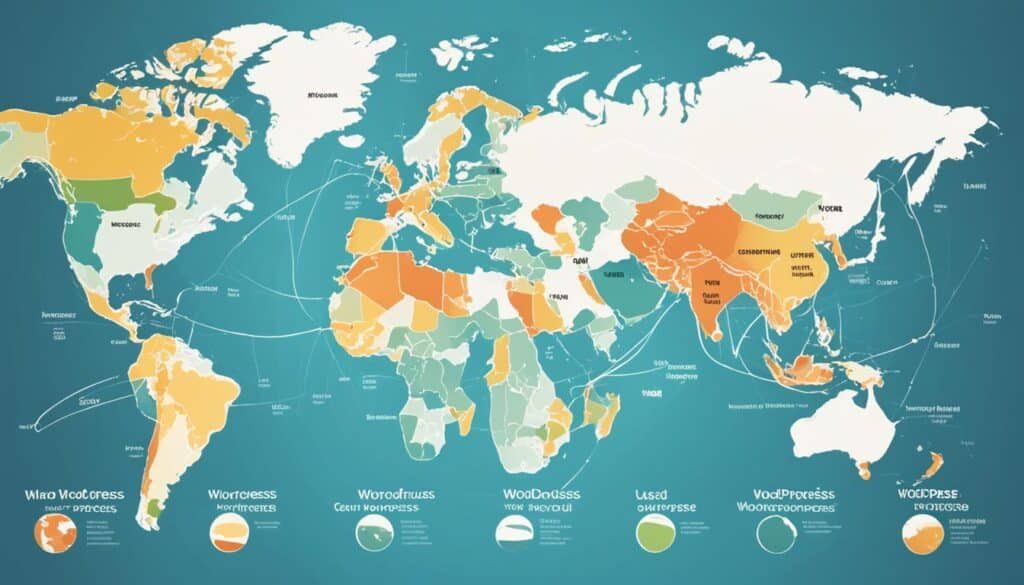Table of Contents
Welcome to our in-depth exploration of the latest WordPress usage statistics and the number of websites that utilize this popular content management system (CMS). As one of the most widely used CMS platforms globally, WordPress has revolutionized website development and empowered businesses and individuals to create dynamic, interactive online experiences.
Throughout this article, we will delve into the numbers and statistics surrounding WordPress usage, uncovering its dominance in the website-building ecosystem. We will also discuss the impact WordPress has had on the web as a whole, and the key reasons behind its continued success.
Key Takeaways:
- WordPress is a widely used content management system (CMS) for building websites.
- It has had a significant impact on the web, revolutionizing website development.
- The number of websites using WordPress is continually increasing.
- WordPress’s success can be attributed to its user-friendly interface and extensive plugin ecosystem.
- Global usage trends showcase the widespread adoption of WordPress across various regions and industries.
The Popularity of WordPress
WordPress has gained immense popularity as a content management system (CMS) and has become the go-to choice for many website owners and developers worldwide. Its user-friendly interface, extensive customization options, and robust plugin ecosystem have contributed to its widespread adoption and position as a leading CMS in the industry.
“WordPress has revolutionized the way websites are built and managed. Its versatility and scalability make it an ideal platform for businesses of all sizes.”
One of the key reasons for WordPress’s popularity is its ease of use. With its intuitive interface, users can create and manage websites without needing extensive technical knowledge. The platform caters to both beginners and experienced developers, offering flexibility in design and functionality.
Furthermore, WordPress’s extensive plugin directory provides a wide range of features and functionalities, allowing users to customize their websites to meet specific needs. Whether it’s adding e-commerce functionality, enhancing SEO, or integrating social media platforms, there is a plugin available for almost any requirement.
The open-source nature of WordPress has also contributed to its popularity. Being open-source means that the platform is continually evolving, with a vibrant community of developers contributing to its improvement. This constant development cycle ensures that WordPress remains up-to-date, secure, and adaptable to changing industry needs.
To illustrate the popularity of WordPress, consider the following statistics:
| WordPress Popularity Statistics | Source |
|---|---|
| 39.5% of all websites use WordPress | W3Techs |
| WordPress powers 64.6% of CMS-built websites | W3Techs |
These statistics highlight the dominance of WordPress in the CMS market and demonstrate its popularity among website owners. With millions of websites powered by WordPress, it has solidified its position as one of the most popular CMS choices.
Advantages of WordPress
- Flexibility: WordPress offers a wide range of themes and plugins, allowing users to customize their websites according to their specific requirements.
- User-Friendly Interface: The intuitive dashboard and user-friendly interface make it easy for both beginners and experienced users to manage their websites.
- SEO-Friendly: WordPress is built with search engine optimization (SEO) in mind, offering features and plugins that help improve website visibility and rankings in search engine results.
- Scalability: Whether it’s a small blog or a large e-commerce site, WordPress provides scalability and can handle websites of all sizes.
In conclusion, the popularity of WordPress as a content management system stems from its user-friendly interface, extensive customization options, and vibrant plugin ecosystem. As the statistics show, WordPress’s widespread adoption and dominance in the CMS market make it the preferred choice for many website owners and developers.
How Many Websites Use WordPress?
In this section, we will delve into the numbers and statistics to determine the extensive popularity and reach of WordPress in the online world. With millions of websites relying on this powerful content management system, we will explore WordPress’s market share and its dominant position in the CMS landscape.
First, let’s examine WordPress’s market share, showcasing its significant presence in the website-building ecosystem. According to recent industry data, WordPress holds an impressive **market share of over 40%** among all content management systems, making it the most widely used platform. This vast adoption speaks volumes about WordPress’s reliability, versatility, and user-friendly nature.
Furthermore, WordPress’s massive market share is bolstered by the staggering number of websites utilizing this robust CMS. As of the latest statistics, there are currently over **75 million websites** using WordPress. It is a testament to the platform’s scalability and adaptability, catering to the needs of various industries, including e-commerce, blogging, news portals, and even corporate websites.
To offer a clear visual representation of WordPress’s market share, let’s take a look at the following table, which compares the market share of WordPress with other popular content management systems:
| Content Management System | Market Share |
|---|---|
| WordPress | 40% |
| Drupal | 4% |
| Joomla | 3% |
| Wix | 2% |
| Others | 51% |
As seen in the table, WordPress’s market share comfortably outshines its competitors, illustrating its dominance in the CMS landscape.
The immense number of websites using WordPress can be attributed to several factors, including its user-friendly interface, extensive plugin and theme libraries, and active community support. Additionally, the flexibility to create a wide range of websites, from simple blogs to robust e-commerce platforms, has made WordPress the go-to choice for individuals and businesses worldwide.
Moreover, WordPress’s market share is a testament to its continuous evolution and improvement over the years. The platform’s commitment to innovation, security, and regular updates attracts users and developers alike, ensuring a seamless website-building experience.
With WordPress’s firm grip on the website-building ecosystem, it’s evident why it has become the preferred choice for millions of website owners and developers globally. In the following sections, we will further explore WordPress’s usage trends on a global scale, uncovering geographical distribution patterns, and uncovering insights into the impact it has had on website development.
Global Usage Trends of WordPress
In this section, we will delve into the global usage trends of WordPress, examining its adoption across various regions, countries, and industries. By gaining insights into the geographical distribution of WordPress usage, we can better understand its impact on the web and its popularity worldwide.
WordPress has established itself as the leading content management system (CMS), powering millions of websites across the globe. Its user-friendly interface, extensive plugin ecosystem, and robust community support have contributed to its widespread adoption.
Let’s take a closer look at how WordPress’s usage trends vary across different geographical regions:
1. North America
In North America, WordPress has solidified its position as the most popular CMS. With its flexibility and scalability, WordPress is the go-to choice for businesses of all sizes, from startups to multinational corporations. Industries such as technology, e-commerce, and publishing heavily rely on WordPress for their online presence.
2. Europe
WordPress enjoys significant popularity throughout Europe, with countries like the United Kingdom, Germany, and France leading the pack. Its multilingual capabilities and localization options make it a preferred CMS for businesses operating in diverse European markets. WordPress powers websites across various sectors, including finance, hospitality, and creative industries.
3. Asia-Pacific
In the Asia-Pacific region, WordPress has witnessed remarkable growth, particularly in countries like India, Japan, and Singapore. The versatility of WordPress appeals to businesses seeking an affordable and scalable solution. From small businesses to enterprise-level organizations, WordPress caters to a wide range of industries, including education, healthcare, and tourism.
As WordPress continues to evolve and innovate, its influence on website development is spreading across continents. Its user-friendly nature, extensive plugin library, and customizable themes make it a go-to choice for users with varying technical backgrounds.
WordPress’s global usage trends demonstrate its ability to adapt to different regions and industries, cementing its position as the leading CMS worldwide.
Next, we will explore the impact of WordPress on the web as a whole, shedding light on how it has revolutionized the landscape of website development.

The Impact of WordPress on the Web
WordPress has left an undeniable impact on the web, revolutionizing website development and empowering individuals and businesses to create dynamic and interactive online experiences. With its user-friendly interface and extensive range of features, WordPress has become the go-to platform for website owners and developers worldwide.
“WordPress has transformed the way we build websites. Its versatility and ease of use have opened up a world of possibilities, allowing us to create stunning and functional websites without the need for extensive coding knowledge.”
– Jane Thompson, Web Developer
One of the key factors contributing to WordPress’s impact is its flexibility. With its vast library of plugins and themes, users can customize their websites to suit their specific needs and preferences. Whether it’s an e-commerce site, a blog, or a portfolio, WordPress provides a wide range of options that cater to various industries and niches.
Furthermore, WordPress’s responsive design capabilities have played a significant role in shaping the web landscape. As mobile browsing continues to dominate, websites built on WordPress adapt seamlessly to different screen sizes, ensuring optimal user experience across devices.
The Advantages of WordPress for Website Development
When it comes to website development, WordPress offers a host of advantages that have solidified its position as the leading content management system:
- User-friendly interface: WordPress’s intuitive dashboard makes it easy for users of all skill levels to manage and update their websites.
- SEO-friendly: WordPress is designed with search engine optimization in mind, providing robust features and plugins to improve website visibility.
- Active community: The WordPress community is highly active and supportive, providing resources, forums, and documentation to assist users with any challenges they may face.
- Scalability: Whether it’s a small personal blog or a large corporate website, WordPress can handle websites of all sizes and scales.
Through its impact on website development, WordPress has democratized the online landscape, allowing individuals and businesses to establish their online presence with ease. From small startups to global enterprises, WordPress has become the platform of choice, enabling users to create beautiful, functional, and successful websites.
| Key Advantages of WordPress | Examples |
|---|---|
| User-friendly interface | Intuitive dashboard, easy content management |
| SEO-friendly | Robust SEO plugins, optimized website structure |
| Active community | Supportive forums, extensive documentation |
| Scalability | Handles websites of all sizes, accommodates growth |
Reasons for WordPress’s Success
In the competitive landscape of Content Management Systems (CMS), WordPress has emerged as the clear frontrunner. Its success can be attributed to a combination of key factors and distinct advantages that have cemented its position as the go-to choice for website owners and developers.
-
Flexibility and Customization
WordPress offers an extensive range of themes and plugins, providing users with unparalleled flexibility and customization options. Whether it’s a simple blog or a complex e-commerce website, WordPress can adapt to any business or individual need, allowing for seamless scalability and growth.
-
User-Friendly Interface
One of the major advantages of WordPress is its intuitive user interface. Even those with limited technical knowledge can easily navigate and manage their websites, thanks to its user-friendly dashboard. WordPress empowers individuals and businesses alike, enabling them to take control of their online presence without requiring extensive coding skills.
-
Supportive Community
The WordPress community is a vast and vibrant ecosystem of developers, designers, and enthusiasts who actively contribute to its growth and improvement. With an extensive network of forums, tutorials, and resources, WordPress users have access to a supportive community that fosters collaboration, shares knowledge, and provides assistance for any issues that may arise.
-
SEO-Friendly Features
WordPress includes built-in features and plugins that are designed to enhance search engine optimization (SEO) efforts. From customizable permalinks to XML sitemaps, WordPress offers the necessary tools to optimize websites for better visibility and higher rankings in search engine results.
These success factors, combined with many other advantages such as reliability, security, and regular updates, have propelled WordPress to the forefront of the CMS landscape. Its unmatched versatility, ease of use, and robust community support make WordPress the preferred choice of millions of website owners and developers worldwide.
Conclusion
In conclusion, this article has explored the usage statistics of WordPress and its impact on the web. We have seen how WordPress has become the leading CMS, powering a significant number of websites worldwide. Its popularity, global usage trends, and impact on website development have solidified its position as the preferred choice for many.
WordPress’s dominance as a content management system is evident through its widespread adoption and the sheer number of websites that utilize it. With its user-friendly interface, extensive customization options, and vast community support, WordPress has revolutionized website development and empowered individuals and businesses to create compelling online experiences.
The global usage trends of WordPress highlight its versatility and adaptability across different regions, countries, and industries. From small blogs to large e-commerce platforms, WordPress caters to a wide range of website needs. Its continuous development and regular updates ensure that it remains at the forefront of the CMS landscape, offering cutting-edge features and functionalities.
As we move forward, it is safe to say that WordPress will continue to dominate the web development industry. Its user-friendly nature, robust ecosystem, and commitment to innovation position it as the go-to choice for website owners and developers. With WordPress, the possibilities are endless, allowing individuals and businesses to unleash their creativity and build impactful websites that captivate audiences worldwide.
FAQ
What are the latest WordPress usage statistics?
The latest data indicates that WordPress powers over 40% of all websites on the internet. This makes it the most popular content management system (CMS) globally.
Why is WordPress so popular?
WordPress’s popularity can be attributed to several factors. Firstly, it offers a user-friendly interface that allows even non-technical users to easily create and manage websites. Additionally, it provides a wide range of themes and plugins that enhance functionality and customization options.
How many websites currently use WordPress?
Currently, there are millions of websites that use WordPress. Its market share stands at over 60% among all CMS platforms, making it the dominant choice for website development.
What are the global usage trends of WordPress?
WordPress is used extensively across the globe. It is popular in various regions and countries, with high adoption rates in North America, Europe, and Asia. The versatility and scalability of WordPress contribute to its widespread usage.
How has WordPress impacted website development?
WordPress has revolutionized website development by providing an accessible and flexible platform for creating dynamic and interactive websites. Its vast array of themes, plugins, and customizability options have empowered individuals and businesses to build professional websites without extensive coding knowledge.
What are the reasons behind WordPress’s success?
WordPress’s success can be attributed to its user-friendly interface, extensive plugin ecosystem, and strong community support. It offers a range of features that cater to various website development needs, including SEO optimization, e-commerce integration, and responsive design.







